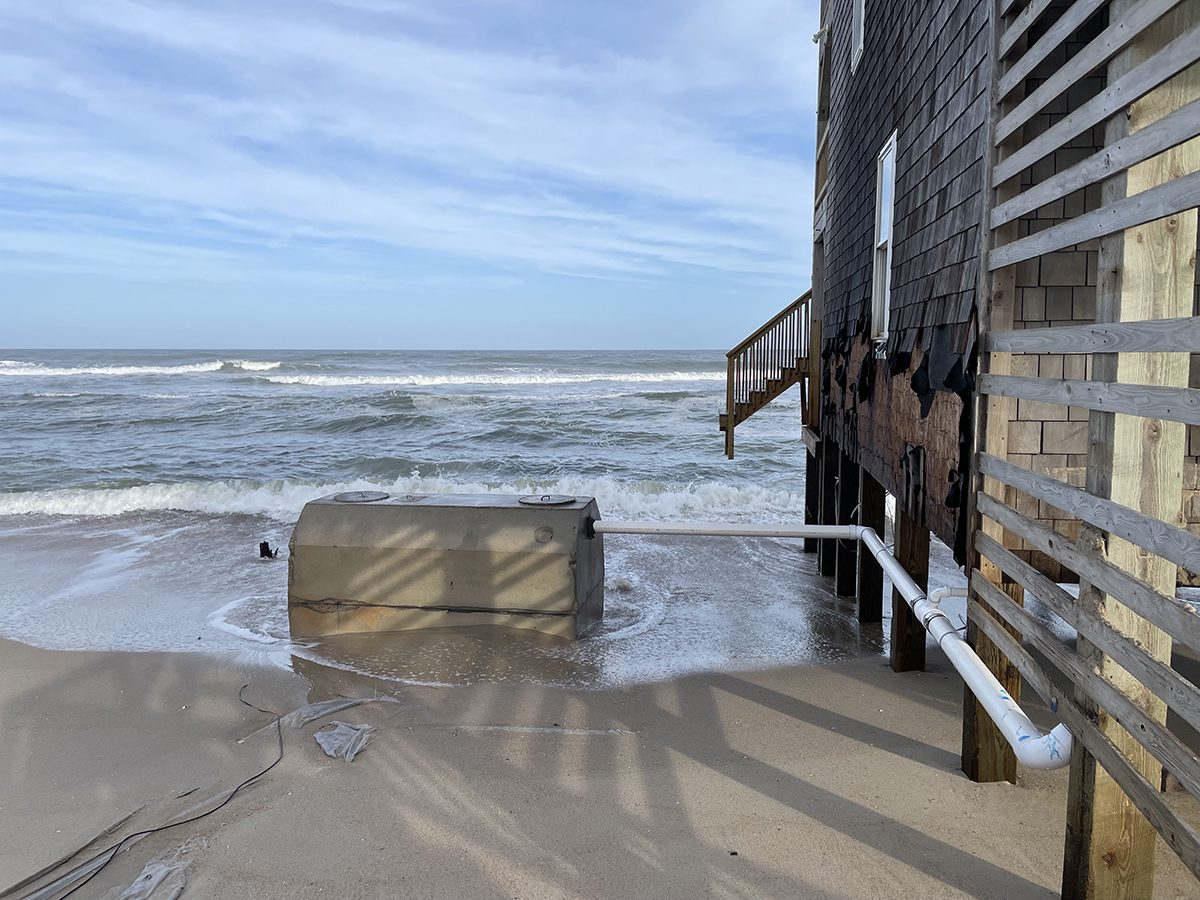
The state Coastal Resources Commission, when it meets next week in Ocean Isle Beach, is expected to consider proposed rule changes to address permitting questions and concerns about the repair, replacement and relocation of onsite wastewater treatment systems and septic tanks on the public beach, where they are subject to repeated overwash and erosion damage.
The commission is to meet at 9 a.m. Feb. 23 at the Ocean Isle Beach town hall, 111 Causeway Drive, Ocean Isle Beach. A public comment period is scheduled for 11 a.m. At the chair’s discretion, comments may be limited to three minutes per person.
Supporter Spotlight
Also next week, the Coastal Resources Advisory Council is to meet at 1 p.m. Feb. 22 at the Ocean Isle town hall. Following the advisory council meeting, its members, commissioners and Division of Coastal Management staff plan to take a field trip to the terminal groin that was completed in April 2022 at the east end of Ocean Isle Beach.
Both meetings and the field trip are open to the public.
In Rodanthe on Hatteras Island, where the rate of beach erosion is among the most severe on the state’s coast, storms have caused at least two dozen septic or wastewater system failures and discharges onto the public beach during the past year. Several systems were repaired and then washed out again.
Division staff have proposed amendments that would clarify that replacement of a septic tank or drain field seaward of the vegetation line or measurement line will require a Coastal Area Management Act, or CAMA, permit. The change identifies the two components of a septic system as separate structures for repair or replace determinations. If either structure cannot be repaired in place, they would be subject to erosion-rate-based setbacks that apply to other oceanfront structures.
Also, septic tanks and drain fields relocated with public funds must meet the appliable ocean hazard setback. If private funds are used, the systems may not be replaced or relocated within the public trust areas of ocean beaches.
Supporter Spotlight
“This area is in constant flux due to the action of wind, waves, tides, and storms and includes the wet sand area of the beach that is subject to regular flooding by tides and the dry sand area of the beach that is subject to occasional flooding by tides, including wind tides other than those resulting from a hurricane or tropical storm,” according to division documents. “The landward extent of the ocean beaches is established by the common law as interpreted and applied by the courts of this State. Natural indicators of the landward extent of the ocean beaches include, but are not limited to, the first line of stable, natural vegetation; the toe of the frontal dune; and the storm trash line.”
Staff said the proposed definition will allow the division to address areas where the siting of septic tanks and drain fields often become problems, most notably on the wet sand beach that is subject to regular flooding and the dry sand beach that is subject to irregular flooding.
It also will allow the division to make allowances for areas affected by hurricanes and tropical storms where septic systems may be damaged by overwash or burial of the vegetation line, but can still be repaired or relocated so as not to affect their function or impact the public trust area.
“Addressing this factor (storm overwash) was one of the primary comments received by the Division,” according to documents.
The staff also proposes an amendment to require that when structures are relocated, all debris and ancillary structures must be removed. “It has been the Division’s experience that old infrastructure, including septic tanks, are not always removed upon the relocation/removal of a primary structure.”
Contrary to what was proposed during the commission’s meeting in November, division staff are not proposing changes to rules based on the cost to repair. If a septic tank or subsurface drain field must be replaced, a CAMA permit will be required.
Rules dispute
The commission is expected to discuss the state Rules Review Commission’s objections to coastal management rules that were readopted in 2022 and that the review panel has since deemed lacking in statutory authority, unclear or ambiguous, unnecessary or failing to comply with the Administrative Procedures Act.
The Coastal Resources Commission disputes the review commission’s position and says the rules are necessary. A closed-session discussion may be held.
Variance requests
In other business, the commission is expected to consider requests from Carolina Beach for a variance from oceanfront setback rules to allow the town to build a new bathhouse. The division in October had denied the town’s CAMA minor permit application as the proposed bathhouse does not meet the setback under the applicable static line exception rules.
Ocean Isle Beach also seeks a variance from sand fencing rules for an Ocean Hazard Area of Environmental Concern to allow the town to use straw bales as sand fencing near its terminal groin because of supply chain issues for traditional wooden sand fencing.
The issue involves six town-owned street ends at the east end of town that are used as beach access points. The town, following completion of its terminal groin, had covered existing sandbags with sand and planted vegetation at the street ends.
Last summer, the division denied the town’s CAMA minor permit application based on concerns expressed by the U.S. Fish and Wildlife Service and the state Wildlife Resources Commission about impacts to nesting sea turtles.
Public hearings
The commission is expected to hold public hearings for proposed amendments to the following rules:
- 15A NCAC 7B State Guidelines for Land Use Planning – Enforceable Policies.
- 15A NCAC 7K .0207 and 7H .0308 Structural Accessway – Beach Mats.
- 15A NCAC 7M .0600 Floating Structure Policies and 7H .0208 Piers and Docking Facilities – Floating Upweller Systems.
A full meeting agenda and briefing materials can be found on the commission website. Times indicated on the agenda for individual items are subject to change.







